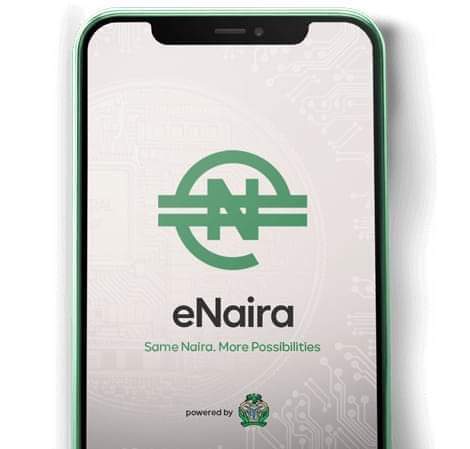Chibuzo Efobi, the CBN director financial policy and regulation department, said 14-page guidelines released by the central bank became effective from Monday, October 25.

The Central Bank of Nigeria (CBN) on Monday, October 25, released regulatory guidelines for the seamless operation of the eNaira, a digital currency of the physical Naira.
Chibuzo Efobi, the CBN’s director financial policy and regulation department who made 14-page guidelines available said they had become effective from Monday, October 25.
Here are seven things you should know about eNaira platform
1. The charges for transactions that originate from the eNaira platform shall be free for the first 90 days commencing from October 25, 2021.
2. Electronic Funds Transfer below N5,000 is charged N10; N5,001 – N50,000 is charged N25 and for above N50,000, a N50 charge is associated.
3. Phone numbers without verified National Identification Number (Tier 0) will have a daily transaction limit of N20,000, while the maximum that the account can hold is N120,000.
4. For phone numbers with verified NIN or Tier 1, CBN said they have a daily transaction cap of N50,000 and a maximum balance of N300,000.
5. Tier Two accounts will have access to a daily transaction of N200,000, while N500,000 is the maximum balance that can be held.
6. The Tier 3 account holder can transact a maximum of N1m daily, while the Maximum balance it can hold is N5m.
7. eNaira Merchant speed wallets shall be used solely for receiving and making eNaira payments for goods and services.

Is it another form of cryptocurrency? Below are four things you need to know about the eNaira.
1. The eNaira is not cryptocurrency:
So, a lot of people are curious to know if this is the same as a Bitcoin or Ethereum or any other crypto assets. The answer is an emphatic no.
According to a circular issued by the CBN after the launch of the currency on Monday, “the eNaira is the digital form of the fiat currency, (Naira), issued by the CBN in line with Section 19 of the CBN Act.
It is a direct liability of the CBN, a legal tender and will form part of the currency in circulation. It will be at par with the physical naira, (that is 1:1).”
Unlike the typical cryptocurrency such as Bitcoin, the eNaira is centralised with the backing of the authorities, which is the CBN here. So, it is just another legal tender.
While blockchain is the underlying technology behind the eNaira; it is not decentralised and cannot be privately controlled like Bitcoin. It also means, unlike the crypto, you cannot trade on the eNaira as an asset class.
2. The eNaira will not lead to oversupply of Naira and cause inflation:
Nigeria’s inflation rate is at a worrisome 17.59% high, although it has been declining over the past 3 months.
So, many people are genuinely concerned about the additional money supply through digital currency. However, this will not cause any price hike as it does not translate into an extra money supply.
At every point in time, the CBN has a particular amount of Naira it wants to be in circulation. Out of the total money in circulation, there is a quota allotted to coins and notes.
So, it only gets an allotment from these cash components. So, in essence, the eNaira instead of leading to an additional money supply will lead to a decrease in the amount of cash in circulation.
3. The eNaira will reduce cost of remittance:
So, the CBN has constantly touted the ability of the eNaira to facilitate cheaper remittances.
One of the major sources of foreign exchange for Nigeria is remittances, so, many wondered if using eNaira for remittance will not lead to FX shortage. But there is no cause for alarm. The digital currency only comes into remittances as an option for the payment of remittance fees.
According to the CBN, the eNaira will make remittance charges cheaper by about 8%.
4. The eNaira will not be insured:
So, what happens if hackers break into its tech and steal users’ money? Well, unfortunately, the eNaira is not insured by the Nigeria Deposit Insurance Corporation, NDIC as is with your naira with the deposit money banks. Still, there is no cause for alarm since it is directly under the CBN and it is still the only institution empowered by law to print the Naira.

